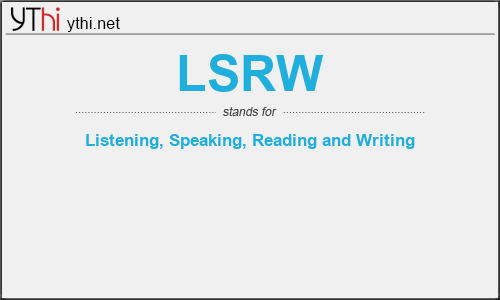What does LSRW mean? What is the full form of LSRW?
The Full Form of LSRW is Listening, Speaking, Reading and Writing.
Reading, writing, speaking and listening – the four foundational skills of language learning.
You can’t build a house without a strong foundation (well, that’s if you want the house to stay upright in all weather!). Similarly, you won’t become a well-rounded speaker of a language without building upon the four foundations of language learning.
It took me quite a while to realise this.
I studied languages for years at school – and even after school without much success. I even moved to Spain to learn Spanish. It was a lightning bolt moment that made me realise I could spend hours learning how to read or write Spanish, but I had to actually start speaking to achieve fluency.
As you continue language learning, you will probably discover that you’re stronger in some areas than others. Typically, people struggle most with listening and speaking.
As humans, we have so many important ways we convey and understand information as we communicate. We are born with ears, and are never actually taught how to listen—it’s understood how to do it, we just start. As kids, we grow up learning how to speak by listening to the people who are close to us and imitating
others. Almost everyone enjoys listening to radio, watching videos, talking on the phone. All of these activities help to develop these skills, just by doing them repetitively, but how often do we focus on these skills that we take for granted? How often do we consciously think that we are learning to read when we listen?
Other language skills such as reading and writing need to be explicitly taught. Researchers have found that the four language skill areas: listening, speaking, reading, and writing are all integrated and contribute to people’s understanding of the world around them. Reading and listening are receptive skills; writing and speaking are productive skills. And according to research, there are substantial correlations among these four language processes. So when students are listening, they are also advancing their other language skills.
While listening and reading share many comprehension processes, there are differences in the way the information is processed. Readers often remember more details and can go back to the text. Listeners construct understanding as they listen and often come away with an overall understanding of ideas (Absalom and Rizzi, 2008). Students who are successful at reading comprehension understand at the sentence level as well as understanding the text as an integrated whole (Perfetti, 2007).
LSRW
means
Listening, Speaking, Reading and Writing![]()
Translate Listening, Speaking, Reading and Writing to other language.


Leave a Reply
You must be logged in to post a comment.